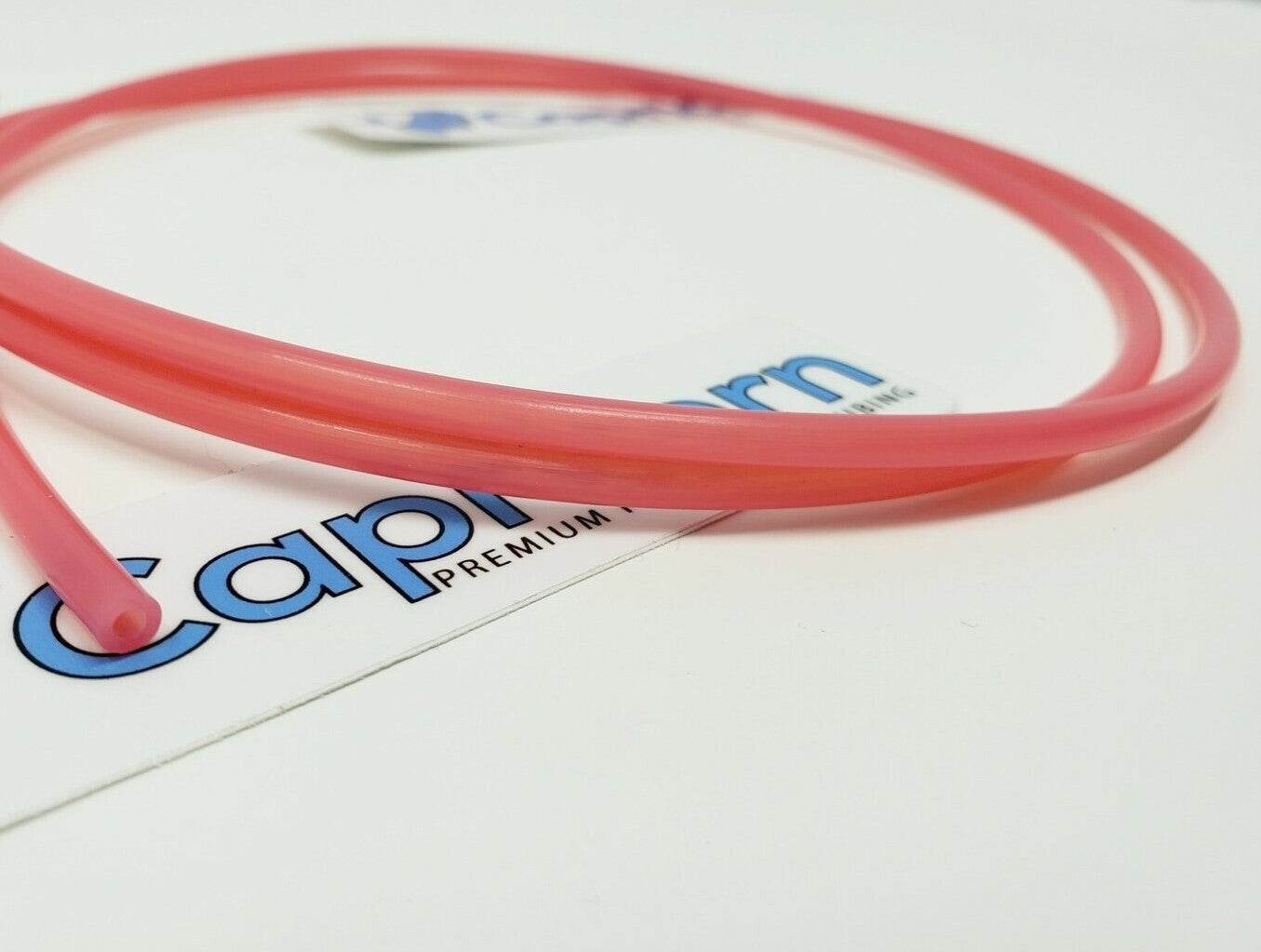PTFE, or Polytetrafluoroethylene, is a synthetic polymer commonly used as a coating for non-stick pots and pans. It is the slipperiest substance known to man, and is said to be the only surface to which a gecko cannot stick. Although Bowden tubes can be made from several different polymers, PTFE is generally considered the best because of its high melting point and low coefficient of friction.
1.75mm Bowden tubing, because of its small diameter, is made with an expensive paste extrusion process. Very precise equipment is needed to obtain a consistent shape and internal diameter. Additives such as colorant are difficult, because the PTFE doesn't readily want to mix with anything. Plain white PTFE is the cheapest and most common.
Capricorn tubing is manufactured using the most sophisticated equipment currently available. It always comes out perfectly round, and the diameter stays as consistent as possible.
Just like filaments, Bowden tubes vary in their real-world diameters. Tubing is often labeled as having an inside diameter of 2.0mm. The measured diameter may vary, however, anywhere from 1.75 to 2.15.
The TL Series High Performance Bowden Tubing is made from the highest quality PTFE, it has a light blue color, and its translucent. It has a good temperature resistance, but not quite as high as XS.
Your printer will look as good as it performs. You are going to love the way your printer looks. Throw that plain white tube in the trash. With a traditional 2.0mm inner diameter, you can print chunky or out of spec filaments with ease.
Because of its translucence, you can see the filament inside, and diagnose any issues that way. If you don't plan to print many flexible or high temperature materials, this is the Bowden Tube for you.
Important Note regarding interpretation of these specifications
Generally it is not safe to bring any PTFE above 260. The somewhat arbitrary melting temperature listed in this table is an indicator of stability of the material and is not indicative of a safe use temperature.
| Opaque White PTFE | Translucent White PTFE | TL Series Light Blue | XS Series Dark Blue | ||
| Additives | None | None | Blue Color | Blue Color and Secret High Performance Additive Mixture | |
| Best For Chunky Filaments | No | No | Yes | Maybe | |
| Best For Flexible Filaments | No | No | No | Yes | |
| Can See Through | No | Yes | Yes | No | |
| Pulling Friction♠ | 1.0 | 0.9 | 0.8 | 0.8 | |
| Color | White | White, Translucent | Blue, Translucent | Dark Blue | |
| Density (kg/m3) | 2100-2200 | 2100-2200 | 2100 +/-100 | 2300 +/-100 | |
| Hardness | 58-62 | 58-62 | 55 | 60-65 | |
| Inner Diameter (mm) | > 2.0 | > 2.0 | 2.0 +/- 0.05 | 1.9 +/- 0.05 | |
| Linear Thermal Expansion at 250 °C | 3.4-3.6% | 3.4-3.6% | 3.4-3.6% | 2.2-3.3% | |
| Material | Cheapest PTFE | Better PTFE | Highest Quality Pure Virgin PTFE | Highest Quality Pure Virgin PTFE | |
| Melting Point (°C)♥ | as low as 220 | around 260-327 | around 340 | around 340 | |
| Outer Diameter | about 4 mm | about 4 mm | 4.075 +/- 0.025 | 3.995 +/-0.025 | |
| Roundness (ϵ) | Variable | Variable | < 0.1 | < 0.1 | |
| Stiffness | High | High | Medium | Medium High | |
| Thermal Conductivity (W/m-k) | 0.25 | 0.25 | 0.25 | 0.25 | |
| Wear Rate (gm/s) | 0.01 | 0.01 | 0.01 | 0.01 | |
| Young's Modulus (GPa) | <0.50 | <0.50 | 0.50 | 0.532 |
| ♠Pulling Friction is calculated as the average force required to pull 1.2 meters of 1.75mm PLA filament through 1 meter of tubing at a constant speed, relative to 1 meter of cheap white reference tubing. Note that although we observed the friction of the TL series to be about the same or even slightly lower than our XS series, it also has a larger internal diameter. |
| ♥PTFE does not transition quickly from a solid to liquid, but acts as a glass, slowly softening. Temperatures were approximated by heating samples of all tubing simultaneously, observing how quickly each one began to deform. |
Full specsheet: Here.

